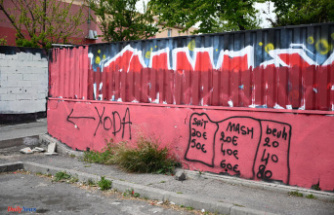Sexuality has become more complicated and political since the premiere of Arthur Schnitzler's "Reigen" around a hundred years ago. That is one of the messages from the ten well-known authors who are bringing just as many scenes from the classic from Vienna in the early 20th century to the global present for the Salzburg Festival.
While Schnitzler's characters almost all got down to business, the new version mainly talks about relationships: Via video link, in the artist's dressing room or in court. The play, co-written by Sofi Oksanen, Leïla Slimani and Sharon Dodua Otoo, among others, received only polite applause at its premiere on Thursday, despite the quality of the cast. Some guests - almost all older men - left the production of Yana Ross prematurely.
The strength of the original lay in its mechanics, which interlocked like clockwork: along the social ladder, the prostitute drives with the soldier, the soldier with the chambermaid, and so on, up to the acting diva and the count, who in turn meets the prostitute . The new "round dance" dissolves this strictness - probably also because sexuality is a broader topic today.
Original updates
Ross lets the ensemble of the Zurich Schauspielhaus act in an elegant restaurant with a thick carpet and mirrored ceiling. The performers look suspiciously similar to the festival audience - from a lady's glittering hair accessories to gentlemen with cashmere sweaters over their shoulders and red socks in slippers.
But appearances are deceptive: Right at the beginning, the Austrian author Lydia Haider unloads a baroque torrent of fecal language. In general, the play's focus is less on sexuality per se and more on verbal violence, alienation, tiring relationships and economic dependency.
The original characters have been translated in an extremely up-to-date manner. The Finnish-Estonian star author Oksanen turned Schnitzler's soldiers and chambermaids into a food messenger (Tabita Johannes) and an online troll (Urs Peter Halter) in the Russian information war against the West. While in the original a young gentleman urges his chambermaid to have sex, in the case of the French-Moroccan writer Slimani, this turns into an abuse process.
Critical moment Sponsored
The Swiss Georg Büchner Prize winner Lukas Bärfuss uses Schnitzler's scene between the count and the prostitute for a dig at the Salzburg Festival: in his dialogue between a ghost (Sibylle Canonica) and a patron of culture (Michael Neuenschwander), metals such as nickel are mentioned - a Reference to the Swiss raw materials company Solway, from which the festival recently parted as a sponsor. Bärfuss and Ross had called for this step because of environmental and human rights allegations against Solway.
Between the scenes, a short film by the Russian exile dramatist Mikhail Durnenkow is faded in, in which his alter ego tells a moving story about fleeing Russia and the persecution of homosexuals.
Production information












